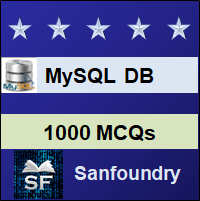
MySQL Multiple Choice Questions Highlights
- 1000+ Multiple Choice Questions & Answers (MCQs) in MySQL with a detailed explanation of every question.- These MCQs cover theoretical concepts, true-false(T/F) statements, fill-in-the-blanks and match the following style statements.
- These MCQs also cover numericals as well as diagram oriented MCQs.
- These MCQs are organized chapterwise and each Chapter is futher organized topicwise.
- Every MCQ set focuses on a specific topic of a given Chapter in MySQL Subject.
Who should Practice MySQL MCQs?
– Students who are preparing for college tests and exams such as mid-term tests and semester tests on MySQL.- Students who are preparing for Online/Offline Tests/Contests in MySQL.
– Students who wish to sharpen their knowledge of MySQL Subject.
- Anyone preparing for Aptitude test in MySQL.
- Anyone preparing for interviews (campus/off-campus interviews, walk-in interview and company interviews).
- Anyone preparing for entrance examinations and other competitive examinations.
- All - Experienced, Freshers and College / School Students.
MySQL Chapters
Here's the list of chapters on the "MySQL" subject covering 100+ topics. You can practice the MCQs chapter by chapter starting from the 1st chapter or you can jump to any chapter of your choice.- General MySQL Use
- Using SQL to Manage Data
- Data Types
- Stored Programs
- Query Optimization
- MySQL Programming
- MySQL Programs Using C
- MySQL Programs Using Perl DBI and PHP
- MySQL Administration
- MySQL Data Directory
- General MySQL Administration
- Access Control and Security
- Database Maintenance, Backups and Replication
- Data Type Reference, Operators and Functions
- System, Status and User Variables
- SQL Syntax
- Select Statement
- Nulls and Conditions and Miscellaneous
1. General MySQL Use
The section contains multiple choice questions and answers on database terminology, mysql setup and interactions.
|
|
|
2. Using SQL to Manage Data
The section contains questions and answers on server sql mode, mysql identifiers and rules, sql statements case sensitivity, selecting, creating, dropping and altering databases, table retrievals with joins, union and subqueries, views, transactions, foreign key, table creation, populating and modifying tables.
3. Data Types
The section contains MCQs on data value categories, datatypes, sequences and type conversions.
4. Stored Programs
The section contains multiple choice questions and answers on compound statements, stored functions, triggers, events and security.
|
|
|
5. Query Optimization
The section contains questions and answers on indexing, query optimizer, choosing and loading data types, scheduling and locking issues, administrative level optimizations, query mechanics and clauses.
6. MySQL Programming
The section contains MCQs on mysql programs and apis.
|
|
|
7. MySQL Programs Using C
The section contains multiple choice questions and answers on compiling and linking client programs, server connection, error handling, processing sql statements, embedded server library, multiple statement execution.
8. MySQL Programs Using Perl DBI and PHP
The section contains questions and answers on perl script characteristics, perl dbi and php overviews.
|
|
|
9. MySQL Administration
The section contains MCQs on mysql components and administration, access control and security, database maintenance, backups and replication.
|
|
|
10. MySQL Data Directory
The section contains multiple choice questions and answers on location, structure and relocating data directory’s.
|
|
|
11. General MySQL Administration
The section contains questions and answers on mysql installation and server startup, managing mysql user accounts, maintaining logs, server tuning, storage engine configuration, running multiple servers, internationalization and localization issues.
12. Access Control and Security
The section contains MCQs on secure connections, internal and external security.
|
|
|
13. Database Maintenance, Backups and Replication
The section contains multiple choice questions and answers on preventive maintenance principles, database backups, checking and repairing database tables, backups for data recovery and replication servers setting.
14. Data Type Reference, Operators and Functions
The section contains questions and answers on numeric, string and spatial data types, operators and functions.
|
|
|
15. System, Status and User Variables
The section contains MCQs on system and session only system variables, status and user defined variables.
|
|
|
16. SQL Syntax
The section contains multiple choice questions and answers on sql statement syntax, compound statement and comment syntax.
|
|
|
17. Select Statement
The section contains questions and answers on select clauses, from clauses, order by clauses, where clauses, group by and having clause.
|
|
|
18. Nulls and Conditions and Miscellaneous
The section contains MCQs on database copies, secure connections, conditional evaluation, null and condition types.
|
|
|
Wish you the best in your endeavor to learn and master MySQL!
